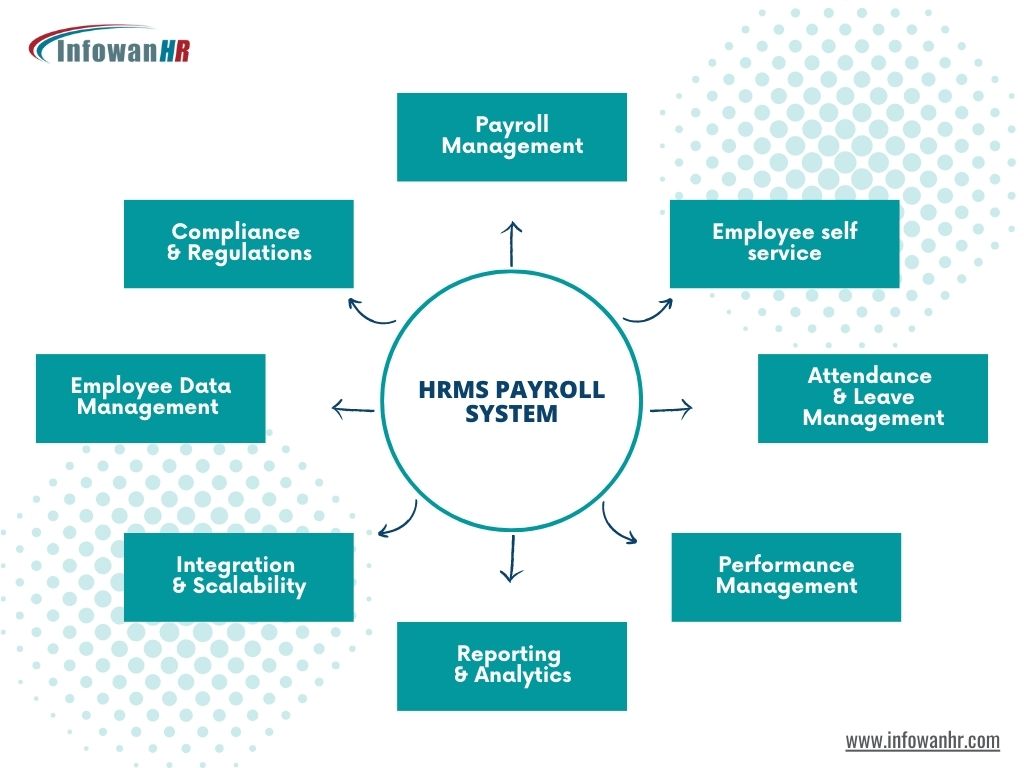“I am convinced that nothing we do is more important than hiring and developing people. At the end of the day, you bet on people, not on strategies.” – Lawrence Bossidy
|
Table of Contents
|
|---|
| Payroll HRMS Software |
| What is HRMS? |
| Top 4 features to expect from any HR software |
| Traditional HR Management |
| Modern HRMS payroll system |

Payroll HRMS Software
What is HRMS?HRMS full form: Human Resource Management System, also known as a Human Resource Information System (HRIS system) is a comprehensive technology solution designed to simplify and automate various HR processes within an organization. It serves as a centralized repository for managing employee data, automating HR tasks, and effective workforce management. As more and more tasks are automated, HR business partners will have more time to focus on strategic initiatives backed up by data insights of the organizations.

1. Employee Data Management: The Human Resources Management System (HRMS) software gives HR professionals the ability to store, organize, and manage employee data in a centralized database. It contains a variety of information, such as personnel profiles, contact information, job history, performance assessments, and facts regarding salary, among other things.
2. Employee Self-Service: Employees have the ability to access and update their personal information, make requests for time off, access pay slips, read corporate regulations, and participate in performance assessments through the use of self-service portals that are commonly included in the software. Employees will feel more in charge as a result, and human resources managers will have fewer administrative tasks to do.
3. Payroll software: Typically HRMS system is designed to interact with payroll systems, which allows for the automation of payroll calculations, tax deductions, and the generation of accurate salary payments. In addition to this, it provides assistance with the management of employee benefits, such as health insurance, retirement programs, and leave balances.
4. Time and Attendance Management: The software may include time and attendance tracking functionality if not it would definitely have the facility to integrate one. It allows employees to log their working hours, tracks attendance, manages vacation and sick leave, and generates reports for accurate payroll processing.
Traditional HR Management1. Paper-Based Processes: Traditional HR administration retained employee records in paper files. These files comprised resumes, contracts, performance reviews, and attendance records. Manual storing was time-consuming and risky.
2. Manual Data Entry: HR staff manually entered employee data and updated records, which was cumbersome and risked data errors. Manual sorting and calculations made data retrieval and analysis difficult.
3. Limited Accessibility: HR departments retained physical paperwork, making it challenging for employees and managers to update their information. This reduced self-service alternatives and increased HR staff dependence.
4. Lack of Integration: Traditional HR systems managed payroll, administration, performance, and employee data separately. Lack of integration caused data duplication, inconsistencies, and administrative costs.
5. Limited Reporting and Analytics: Reporting and data analysis took time and required human data compilation from multiple sources. Data-driven judgments and significant insights were challenging.
6. Compliance Challenges: Staying compliant with changing labor laws and regulations was more challenging with traditional HR systems. Updating and tracking compliance requirements manually was time-consuming and increased the risk of errors and non-compliance.
7. Inefficient Processes: Traditional HR systems relied heavily on manual processes, such as handling paper-based forms, manually calculating payroll, and managing time-off requests. These processes were time-consuming, prone to errors, and hindered efficiency.
Modern HRMS payroll system1. Automation and Digitization: Modern HR systems automate routine tasks, streamline processes, and digitize employee records, eliminating the need for manual paperwork and reducing errors.
2. Self-Service Portals: Employees and managers have access to their information through a self-service portal, which enables them to make changes to their personal data, check salary slips, request time off, and use HR resources whenever it is convenient for them to do so, hence minimizing the amount of administrative work that needs to be done by HR.
3. Integration and Data Consistency: Modern HR systems integrate a variety of HR activities, including payroll, performance management, and employee data. This ensures that the data is consistent, eliminates duplication, and enables a seamless flow of data.
4. Advanced Reporting and Analytics: HR systems now offer extensive reporting and analytics capabilities, which enables HR professionals to generate real-time reports, conduct in-depth data analysis, and get useful insights that can be used for strategic decision-making.
5. Compliance Management: Modern HR systems help automate compliance processes, including tracking regulatory changes, managing employee documentation, and ensuring adherence to labor laws and regulations.
6. Enhanced Efficiency and Productivity: Automation and streamlined processes in modern HR systems save time, reduce administrative burdens, and improve overall efficiency, allowing HR professionals to focus on strategic initiatives.
7. Enhanced Data Security: Modern HR systems provide advanced data security features, such as encryption, role-based access control, and data backup, ensuring the protection and privacy of sensitive employee information.